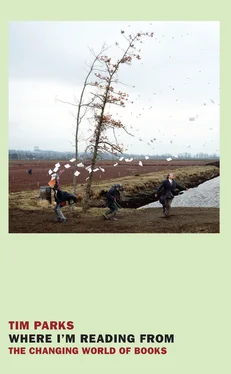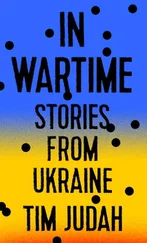It will seem all too easy, this fusion of topography and attitude, but it’s true: my room was sandwiched between my brother’s and my sister’s. It too had a bookshelf. There were no rosy historical romances, no girls clutching a last shred of clothing to their modesty. There were no concordances, no innocent children’s books. Way before I could possibly understand them, there were Tolstoy and Dostoevsky and Chekhov and Flaubert and Zola. These books were foreign. Out of it. They never gave me the crasser joys I craved, but then again they never made me feel I was merely indulging, or merely provoking; I wasn’t locked in a fight with my parents, as it seemed to me my brother was. Neither good nor bad, they were good and bad, there was adventure and debate. If my parents made the whole world black and white, these books were colored and immensely complicated.
Over the past year or two I’ve realized how much this organization of the books in my childhood home still influences my reading and reviewing. When I negatively reviewed a book like William Giraldi’s Busy Monsters , it was because it seemed to me an exercise in literary exhibitionism; intellectuality as an end in itself, self-indulgent performance whose main intention was to encourage the reader to concede that the author was smart, rather as if those biblical concordances had been rewritten by Agnar Mykle. When I admired aspects of Dave Eggers it was because I recognized his constant division of the world into good and evil, and when I doubted him it was because in the end it seemed to me he was preaching. The analyses I offered of Fifty Shades of Grey and Stieg Larsson’s Millennium trilogy were very much operations in understanding their position in the geography of our old family bookshelves. Funnily enough, their immense success immediately makes sense when described in this way. They are both books that allow you to read a little hard violent sex while siding with a hero or heroine eager to eliminate such things from the world. Anyone turning to my piece on Peter Matthiessen in The New York Review of Books will now understand both my attraction to his novel In Paradise and my reservations.
Will I never escape from this? Is it a miserable limitation? Should they stop commissioning reviews from me? We all have our positions. Identity is largely a question of the pattern of our responses when presented with a new situation, a new book. Certainly the idea of impartiality is a chimera. To be impartial about narrative would be to come from nowhere, to be no one.
The challenge, I suppose, is to be aware of one’s habits, to be ready to negotiate, even to surprise oneself. Perhaps it’s the books that very slightly shift an old position, or at least oblige you to think it through again, that become most precious. I still recall my perplexity, then growing pleasure, when I read Peter Stamm a couple of years ago: first a sense that his novels were truly different; not the fireworks of would-be experimentalism, but a voice I hadn’t heard before. I had to struggle to place it, to find where I stood in relation to it. Essentially, Stamm constructs stories that my background leads me to think of as moral dilemmas—as in the case of a long extramarital affair in which the mistress falls pregnant—but that his characters understand entirely in terms of fear and courage, dependence and independence. The writing is, if I can put it this way, comically serious, in its simultaneous awareness of and refusal to engage with the moral side of events. In the end I was fascinated.
II. The Book in the World
WHAT’S WRONG WITH THE NOBEL?
SO THE SWEDISH poet Tomas Tranströmer wins the Nobel Prize. Aside from a couple of long poems available on the Internet, I haven’t read Tranströmer, yet I feel sure this is a good decision in every way. Above all for the Nobel jury. Let me explain.
There are eighteen of them, members of an organization called the Swedish Academy, which back at the end of the nineteenth century was given the task of awarding the Nobel. At the time two members suggested it was a mistake to accept the job. The Academy’s founding brief, back in 1786, was to promote the “purity, strength, and sublimity of the Swedish language.” Was this compatible with choosing the finest oeuvre of “an idealistic tendency” from anywhere in the world?
All members of the Academy are Swedish and most of them hold full time professorial jobs in Swedish universities. On the present jury there are just five women, and no woman has ever held the presidency. Only one member was born after 1960. This is partly because you cannot resign from the Academy. It’s a life sentence. So there’s rarely any new blood. For the past few years, however, two members have refused to cooperate with deliberations for the prize because of previous disagreements, one over the reaction, or lack of it, to the fatwa against Salman Rushdie and the other over awarding the prize to Elfriede Jelinek, a writer whom the dissenting member felt was “chaotic and pornographic.”
How do these people decide who are the greatest novelists and/or poets of the day on the international scene? They call on scores of literary experts in scores of countries and pay them to put down a few reflections about possible winners. Such experts are supposed to remain anonymous, but inevitably some have turned out to be acquaintances of those they have nominated.
Let’s try to imagine how much reading is involved. Assume that a hundred writers are nominated every year—it’s not unthinkable—and that the jury starts by reading one book from each of them. But of course this is a prize that goes to the whole oeuvre of a writer, so let’s suppose that as they hone down the number of candidates they now read two books of those who remain, then three, then four. It’s not unlikely that each year they are faced with reading two hundred books (this on top of their ordinary workloads). Of these books, very few will be written in Swedish and only some will be available in Swedish translation; many will be in English, or available in English translation. But since the English and Americans notoriously don’t translate a great deal, some reading will have to be done in French, German, or perhaps Spanish translations from more exotic originals.
Remember that we’re talking about poems as well as novels and that these works are coming from all over the world, many intensely engaged with cultures and literary traditions of which the members of the Swedish Academy understandably and forgivably know little. So it’s a heterogeneous and taxing bunch of books these professors have to digest and compare, every year. Responding recently to criticism that in the last ten years seven prizes have gone to Europeans, Peter Englund, the president of the current jury, claimed its members were well equipped for English but concerned about their strengths in such languages as Indonesian. Fair enough.
Let’s pause for a moment, here, and imagine our Swedish professors, called to uphold the purity of the Swedish language, as they compare a poet from Indonesia, perhaps translated into English, a novelist from Cameroon, perhaps available only in French, and another who writes in Afrikaans but is published in German and Dutch, and then a towering celebrity like Philip Roth, who they could of course read in English, but might equally feel tempted, if only out of a sense of exhaustion, to look at in Swedish.
Do we envy them this task? Does it make much sense? The two members who a century ago felt the cup should be allowed to pass from them were worried that the Academy would become “a cosmopolitan tribunal of literature.” Something they instinctively felt was problematic. They were not wrong.
Читать дальше












